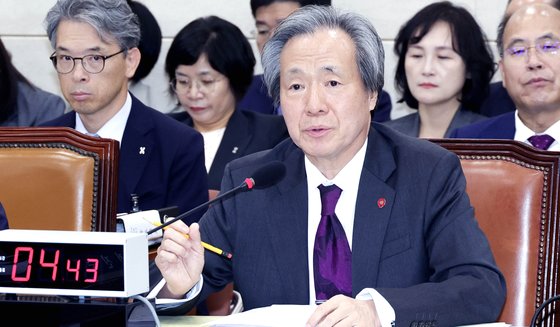Jeong Ki-seok, chairman of the National Health Insurance Corporation, said that health insurance finances are “running well without a major hit” amid the medical vacuum following the departure of medical residents last February. The National Health Insurance Corporation has also experienced a freeze in health insurance premium rates for the first two consecutive years since its founding, raising concerns about its financial soundness.
Chairman Chung held a press conference in Jongno-gu, Seoul on the 27th and made this announcement. Chairman Jeong said, “I am very worried because this is the first time that health insurance premiums have been frozen for two consecutive years since the foundation of the corporation,” but added, “This year, salary expenditures have not increased, so the frozen amount is being offset. “There is no such big hit in terms of spending,” he explained.
Health insurance funds are being invested in resolving the medical gap following the departure of medical residents in February, raising concerns about financial soundness. Regarding this, Chairman Jeong said, “It will be repaid next year, but about 2.6 trillion won (as an advance payment to the hospital) was invested in advance, and 600 to 700 billion won was spent in relation to the emergency treatment system.”
Chairman Jeong explained, “It is currently operating well because (benefit) claims are not the same as before.” He answered, “Many of the top general hospitals have recovered, and ‘excessive consumption’ at tertiary hospitals has been reduced so much that there will be no problem with spending.”
Chairman Jeong, who is confident that “we are making over KRW 1 trillion in profit from fund management” by investing in reserves this year, emphasized, “I will spend sparingly so that after I leave this position, there will be no people saying, ‘The former chairman made a mistake and our finances collapsed.’” did it
The National Health Insurance Corporation is also promoting non-benefit arrangements to manage salary expenditures. Chairman Jeong said, “We are tracking more than 95% of the non-benefit systems by organizing about 1,068 of them, and we do not even know how many there are. We will work hard to organize them well and make it a reasonable non-benefit system.”

In addition, he supported the government’s ban on combined reimbursement and non-reimbursement treatment, which is being promoted as part of medical reform, saying it was “my long-time wish.” Chairman Jeong said, “I don’t think it is appropriate to combine covered and non-covered treatments with similar efficacy.” He added, “I plan to ask the Korea Health and Medical Research Institute to verify whether it is really effective to provide manual therapy (non-covered treatment) and physical therapy (covered treatment) on the same day.”
Chairman Jeong said that as an unresolved issue this year, “the Corporation Special Judicial Police (Special Police) Act has not yet been passed.” He argued, “The opening of medical institutions by non-medical practitioners or the operation of pharmacies by non-pharmacists must be prevented for the sake of a just society.”
The National Health Insurance Corporation was hoping that the ‘Amendment to the Judicial Police Service Act’, which would grant special police authority to the National Health Insurance Corporation, would be submitted to the first subcommittee for bill review held on the 26th, but it did not make it onto the agenda. The National Health Insurance Corporation claimed that if the special police system is introduced, the detection of illegally opened medical institutions such as office hospitals, which takes more than 11 months on average, can be accelerated by up to 3 months.
Sanghyeok Moon ([email protected])

**Given the ongoing challenges related to the medical resident exodus and healthcare access, what concrete measures does the National Health Insurance Corporation plan to take to support smaller hospitals and clinics, particularly in rural areas, to ensure equitable healthcare delivery for all Koreans?**
## Interview with Jeong Ki-seok: Navigating Challenges in Korean Healthcare
**Introduction:**
Welcome to World Today News, and thank you for joining us for this in-depth interview with Mr. Jeong Ki-seok, Chairman of the National Health Insurance Corporation of Korea. We’ll be discussing crucial issues facing the Korean healthcare system, including the impact of the recent medical resident exodus, budget constraints, and proposed reforms.
Mr. Chairman, thank you for your time.
**Section 1: Financial Stability and Healthcare Spending**
* **Interviewer:** You’ve stated that health insurance finances are “running well” despite the freeze on premium rates. Can you elaborate on the strategies implemented to manage expenses in the face of this financial constraint, particularly with the added pressure of covering expenses related to the medical vacuum?
* **Guest 1:** Mr. Jeong Ki-seok
* **Interviewer:** Beyond the immediate financial situation, what are your long-term concerns regarding the sustainability of the current funding model for the National Health Insurance Corporation, especially considering the aging population and rising healthcare costs?
* **Guest 1:** Mr. Jeong Ki-seok
* **Guest 2:** Healthcare economist Dr. Kim Min-seo - What are your perspectives on the challenges faced by the National Health Insurance Corporation in balancing cost containment with ensuring access to quality healthcare for all Koreans?
**Section 2: Addressing the Medical Vacuum and Access to Care**
* **Interviewer:** You mentioned that top general hospitals have recovered from the impact of the medical resident exodus. How is the National Health Insurance Corporation supporting smaller hospitals and clinics, which may still be struggling to provide timely and adequate care?
* **Guest 1:** Mr. Jeong Ki-seok
* **Guest 2:** Dr. Lee Eun-ji - Representing the Korean Medical Association, what are the perspectives of medical professionals on the government’s response to the medical resident shortage, and what further measures would you recommend to ensure sustainable healthcare access?
**Section 3: Reform and Future Directions**
* **Interviewer:** The government’s ban on combined reimbursement and non-reimbursement treatments is a significant reform. Can you discuss the rationale behind this decision and how the National Health Insurance Corporation plans to ensure its effective implementation?
* **Guest 1:** Mr. Jeong Ki-seok
* **Interviewer:** Mr. Chairman, you mentioned the need for legislation to grant special police authority to the National Health Insurance Corporation. What specific benefits do you anticipate this will bring to the healthcare system, and how will it address current challenges?
* **Guest 1:** Mr. Jeong Ki-seok
* **Guest 2:** Legal expert Professor Park Jin-woo – What are the potential legal and ethical considerations surrounding the proposed special police authority, and how can these be carefully addressed to ensure a balanced approach?
**Closing:**
Thank you, Mr. Chairman and our guests, for providing insightful perspectives on the complex challenges and opportunities facing Korean healthcare. Your insights will undoubtedly contribute to a deeper understanding of the issues at hand and foster informed public discourse on the future of healthcare in Korea.
